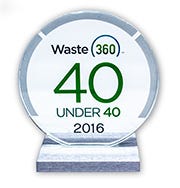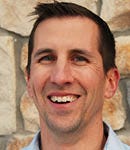Waste360 spoke with Freeman about how he helped increase Denver’s diversion rate and residential compost program and his new role at RRS.
Juri Freeman, senior consultant at Resource Recycling Systems (RRS) and talented bluegrass musician, used his passion for recycling and the environment to help increase the City of Denver's diversion rate and grow its residential compost program. As the former recycling program manager for the City of Denver, Freeman managed the recycling and compost programs for more than 174,000 households, 150 Denver Public Schools and 10,500 city employees.
Freeman also previously served as secretary for the Solid Waste Association of North America's (SWANA) Colorado and Rocky Mountain Chapter Board of Directors. He is still an active member of SWANA, but devotes most of his volunteer time as president of the State Recycling Organization (CAFR) and serving on the National Recycling Coalition Board of Directors.
"Juri has a strong commitment to environmental concerns, not only in the workplace but in his personal life as well," says Freeman's former coworker Lisa Skumatz. "He has been able to follow his desire to improve the world around him while excelling on a successful career path to support the recycling and environmental communities. Not only is a fast learner, but he is always willing to learn and make connections from one project to the next. He is able to balance work and family and still enjoy playing music and snowboarding. He has occasionally been able to combine all of those by playing with the band at a Colorado recycling conference. He has a clear sense of what is important to him, and he works hard to uphold those ideas while inspiring others through his support, positive attitude and continual work to improve himself and those around him."
Freeman was honored with a Waste360 40 Under 40 award earlier this year, and Waste360 spoke with him recently about how he helped increase Denver’s diversion rate and residential compost program, his new role at RRS and what he sees for the future of the waste and recycling industry.
 Waste360: Tell us about how you began your career in the waste and recycling industry.
Waste360: Tell us about how you began your career in the waste and recycling industry.
Juri Freeman: I went to school at Bucknell University, where I majored in economics and environmental science. While in college, I held an internship at the local conversation district. After I graduated, I landed a job right out of college, but I wasn't ready for it and it ended up not being a good fit for me. I decided to leave that job and take some time off to play in a nationally touring bluegrass band. I had a great time doing that, but it was a hard lifestyle to travel all the time, play up to 200 shows a year and try to make a living.
About 10 years ago, I got back into the recycling industry. I worked for Lisa Skumatz at Skumatz Economic Research Associates, which is a small consulting firm in Colorado, for eight years. From there, I moved on to become the recycling manager for the City of Denver for three years. In that role, I managed the city's residential, school and facility recycling and composting programs. And now, I am a senior consultant with RRS, and I have been in this role for a few months.
Waste360: What are some of your responsibilities in your new role at RRS?
 Juri Freeman: I am working in the public sector, but we do have a mix of both public and private clients. In the public sector, RRS is focused on a range of topics like solid waste planning, model forecasting, recycling composting program design and implementation and sustainable materials management programs. I have a hand in all of those things, and I have some really fun clients that I get to work with.
Juri Freeman: I am working in the public sector, but we do have a mix of both public and private clients. In the public sector, RRS is focused on a range of topics like solid waste planning, model forecasting, recycling composting program design and implementation and sustainable materials management programs. I have a hand in all of those things, and I have some really fun clients that I get to work with.
Waste360: How did you help increase Denver's diversion rate and residential compost program?
Juri Freeman: One of the biggest challenges that we faced during this process was getting residents on board with our ideas and programs. I worked a lot with the city's staff to ensure them that our programs made sense and would help the city become more sustainable. I also did a lot of outreach and education with members of the city outside of public works.
For example, one of the first things I did in the city was share a lot of data on Denver's existing recycling rates with residents and city members because they perceived Denver as a leader in recycling, but there was actually a lot of work that needed to get done. Sharing this information helped me connect with them on a different level so that they understood the goals and the importance of hitting them.
Growing the composting program was a little different. We knew what we wanted to do, but it all came down to getting the support and the budget to make the program happen.
We also started an initiative that integrated recycling and composting systems into municipal buildings. If the city was asking residents and businesses to compost and recycle more, than the approximately 10,000 city employees should also be recycling and composting in their place of employment.
Waste360: What are your goals for this year?
Juri Freeman: I am on the National Recycling Coalition Board of Directors, and I am the president of the State Recycling Organization. In all of my roles and volunteer efforts, I am looking at sustainable materials management and the bigger picture of how recycling fits into the environment. I think we need to look beyond the end of life and start looking at how things can be designed for sustainability.
RRS has a lot of experience in the packaging field, and it works a lot with material packagers and suppliers to look at the beginning of life as well as the end of life. One of the reasons I switched jobs was because RRS is always trying to figure out how to work with clients to capture more materials so that those materials can be turned into new materials, not just diverted from landfill. To me, reducing materials use and greenhouse gas emissions is the goal of our programs, not keeping materials out of the landfill.
Waste360: What advice would you give to someone entering the waste and recycling industry?
Juri Freeman: Don't be afraid to participate in internships and to get your hands dirty. You need to do whatever it takes when you're first starting off. During my first job, I called upon farmers and asked them how many cows they had and a bunch of other exciting information. (It's safe to say that they didn't like me too much!) But that job helped me get my next job and the job after that. No matter how bad your job may seem, you're still learning skills that will stick with you forever. Also, be sure to get the most out of every job you have, and work hard to move on from those not-so-exciting jobs. It all pays off in the end.
Waste360: Where do you see the industry going in the next five years?
Juri Freeman: I think the industry is moving toward a more holistic type of industry and that people are really starting to understand that just looking at the end of life for products is not enough. We need to figure out how to get producers and manufacturers on board so that everyone is on the same page. I think the down markets have resulted in programs becoming more efficient and the ones that are surviving now are tightening their belts and coming up with new cost-effective ideas.
About the Author(s)
You May Also Like




